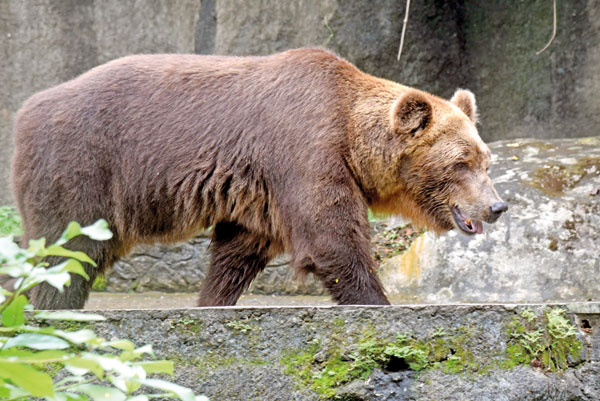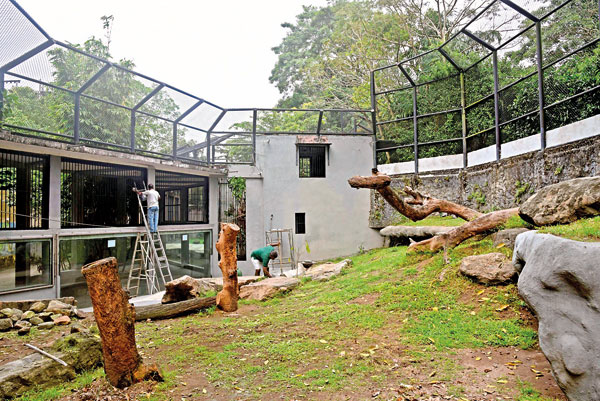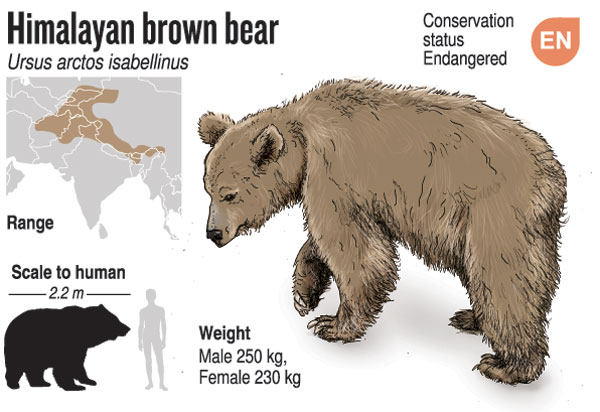News
Zoo awaits more animals, while sprucing up the environs
View(s):By Kasun Warakapitiya
The Department of National Zoological Gardens is undertaking a multi-faceted work plan to improve and strengthen conservation efforts.
The new Director General, Dr Rajapaksalage Chandana Rajapaksa said immediate short-term work has begun, while preparing for long-term work. Directives have been given to repair and use reusable equipment, while purchasing the tools needed.

The old Eurasian Brown bear Bingo
“The animal keepers, curators, veterinarians and other staffers’ knowledge should be further improved by giving them local and foreign training. They should also be given tools and promotions to raise interest in their work. These also encourage employees to care for the animals with compassion,” he added.
He said getting more animals to Dehiwala zoo and Ridiyagama Safari Park at Hambantota are a priority, especially animals that can be paired with animals kept in solitary confinement.
“Dehiwala zoo has two female zebras and one old female giraffe, and one brown bear. Those animals need partners,’’ he said.
Two Himalayan brown bears (Ursus arctos isabellinus), three pairs of slender tailed meerkats (Suricata suricatta), and two spotted hyenas (Crocuta crocuta) are expected within a week. (See side story) A pair of giraffe and three Chapman Zebra are to be brought into Sri Lanka later.

Preparing the enclosure for two new Himaleyan Brown Bears. Pix by Akila Jayawardena
The zoo had got many animals last year under an animal exchange agreement signed with the “Green Zoological Gardens” in India.
Three pairs of ring tail lemur, two cassowary females and one male, two pairs of capybara, two wallabies and two reticulated pythons were received.
The zoo has sent two pairs toque macaques, two pairs of purple faced langurs, a pair of black palm civet, a pair of giant squirrel, a pair of pygmy hippopotamus, a pair of water monitors, two pairs of green pit viper, two pairs of hard shell terrapin, a pair of hump-nosed lizard, and a pair of Sri Lankan Krait in exchange.
Apart from that, three pairs of spot-billed pelican, two pairs each of jungle fowl and mouse dear, are also to be sent to foreign zoos under animal exchanges.
The zoo is negotiating with foreign zoos to get two orangutans after the orangutan Sakifo died.
Mesh cages are being replaced with more natural enclosures that are separated by moats. Sunday Times saw Monkey Island being built.
Dr Rajapaksa said a three-member committee will look into the landscaping and will meet next month.
He said courts sometimes direct the Dehiwala Zoological garden to take care of animals which are considered case objects, so an animal quarantine section is to be set up.
“Even though we manage space and keep those animals sent by court order, issues arise when those animals have ailments that can spread to animals within the zoo. Quarantine is essential. Even animals acquired by animal exchange programs must be quarantined according to animal production and health regulations,’’ he said.
He said more vegetation will be created at the zoo’s farm so costs could be cut and self-sufficiency could be achieved in feed for herbivores.
| Prep done to welcome bears, meerkats, and hyenas The Department of National Gardens is awaiting the arrival of Himalayan brown bears (Ursus arctos isabellinus) slender tailed meerkats (Suricata suricatta) and spotted hyenas (Crocuta crocuta) from “Capital zoo” in United Arab Emirates (UAE). According to the Chief Veterinary Surgeon of the Dehiwala Zoo, Dr. Dushanthi Dammika Dassanayake, the final preparations were done to receive a pair of brown bears and three pairs of meerkats. The Ridiyagama Safari Park is preparing an enclosure for the pair of spotted hyenas. The three groups of animals will be in quarantine for a month and will not be on display. The male is five years and five months old and weighs about 250 kg, while the female which is four years and eight months old, weighs about 230 kg.
The bears would be housed in a large paddock close to the jaguar enclosure. “First the animals would be confined to the dens where they would be monitored and tested for ailments. This is done to prevent them from transferring any foreign disease to other animals,’’ she said. The diet given by the Capital zoo in UAE is to be followed and then the bears will gradually be trained to eat the food in Dehiwala. The Sunday Times observed zoo staff cleaning, disinfecting and painting the enclosures. Workers said the sides would be covered up with a special polythene to create a species barrier so diseases would not spread from the new animals to other animals and vice versa. Even the waste is to be disposed of separately by incinerating in the zoo. Meerkats that are due will undergo the same procedure. The resident Eurasian brown bear ‘Bingo’ is housed separately. Some visitors have expressed concern over the bear’s worn out appearance and its loneliness. However, Dr Dassanayake clarified that the bear had reached his senior years and is around 39 years old. It is considered to be one of the oldest brown bears in the world. The animal cannot be housed with younger bears as it would not be capable of defending itself. ‘Bingo’ is old, yet healthy. In November and December the animal grows his winter fur coat and reduces feeding and activity. Afterwards the animal sheds fur during the hotter months and appears thinner, Dr Rajapaksa said. | |
| Veterans to mind newcomers Dinushika Manawadu, the Deputy Director of the Department National Zoological Gardens, told the Sunday Times an experienced animal keeper has been selected to handle the two bears. Only two keepers would be allowed to handle them in quarantine. Zoo keeper P Thilak Pushpakumara, who had trained the chimpanzee ‘Tony’, was selected as the main keeper, while another would stand by. “The two bears need to adapt to new surroundings, they would find it difficult to respond to a new language. Patience and compassion are the key to getting them used to me. The animals’ trust must be developed. I will remain most of the time with the bears to feed, provide water and look into their needs,” he said.
|
The best way to say that you found the home of your dreams is by finding it on Hitad.lk. We have listings for apartments for sale or rent in Sri Lanka, no matter what locale you're looking for! Whether you live in Colombo, Galle, Kandy, Matara, Jaffna and more - we've got them all!


